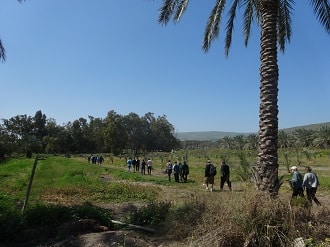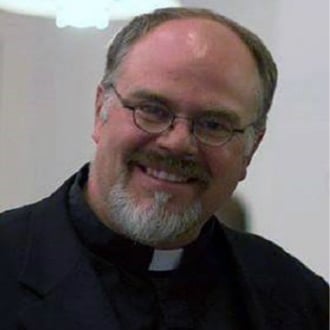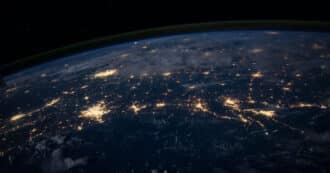Rev. Dr. Martin Otto Zimmann, co-Pastor for the Lutheran Church of the Redeemer in Jerusalem and Assistant to Bishop Munib Younan of the the Evangelical Lutheran Church in the Holy Land and Jordan, shares about his perspectives on faith and ecology
By virtue of my calling and subsequent ordination into the ministry of the Evangelical Lutheran Church in America, I came to understand that the role of pastor (and person) is one of steward within the creatio continua, or ongoing creative acts of God in the universe. In my spiritual journey I began to understand that good stewardship was not so much about how we spent our money or time, but who and what our lifestyle decisions affect to either the benefit or detriment of both. In my research I discovered that my personal lifestyle choices which I had, for the most part, accepted as normative and even benevolent, were in fact harmful and exploitative by their very nature. I began to look for ways and means by which I could lessen my harmful impact on creation through less conspicuous consumption, better stewardship of non-renewal resources, and paradigm shifts in my daily lifestyle.
I also learned that my American lifestyle promoted consumption for the sake of helping the economy, which is a false idol. Because capitalism loves profit more than creation, it will continue to exploit and manipulate humanity and the Earth’s diminishing resources until the planet is no longer inhabitable by our species. If we wish to survive, then we must change our way of thinking and living. This is what I strive to do through example and exhortation in my work.
For a Christian, the very notion of the Jordan is etched in our spiritual underpinnings—this is where God and humanity met in order that we might have a better, more intimate relationship with the very One who sang the stars into existence. My experience during the seminar showed me what I had only read in books—the degradation of a precious landmark holy to Jews, Muslims, and Christians by virtue of the theophanic events linked to our respective faiths. To me, the state of the river is a metaphor for the state of our species. We are suffering a deprivation of the soul, and the restoration of this river not only restores an eco-habitat, but helps in our search for understanding and healing in the Middle East and the world over. The restoration of this river is not simply a good ecological choice, but also a theological imperative.
Christians the world over recognize the Lord’s Prayer (commemorated at the Pater Noster Church on the Mt. of Olives) as the definitive statement of spiritual yearning as given to us by Jesus himself. There is nothing in the prayer about receiving everything we want, but rather that which we need. We need to recognize that God is holy. We need God’s will to be done here on Earth and God’s creation to be complete in the manner in which the Creator intends. We need our daily bread. We need to forgive and be forgiven. We need to be protected from evil impulses that would harm us and cause us to harm others. This is the model of stewardship toward creation for which Christians need to strive. Unfortunately, we all too often pray this prayer with a lack of conviction or intention of ever carrying it out. In the final analysis, the Lord’s Prayer is not about asking God for anything at all except for the strength to change ourselves into better human beings and stewards.
I believe that mobilization on the part of faith communities will only be a matter of time. As the levels of CO2 and methane in the atmosphere continue to increase, the rising temperatures will trigger a positive feedback loop which will continue to melt the permafrost and arctic ice, causing further global paradigm shifts in weather, agriculture, sociology, and economy. Synagogues, mosques, and church communities are in a unique position to form cooperatives that will engender sustainable living in the midst of these changes.
I believe that mobilization on the part of faith communities will only be a matter of time. As the levels of CO2 and methane in the atmosphere continue to increase, the rising temperatures will trigger a positive feedback loop which will continue to melt the permafrost and arctic ice, causing further global paradigm shifts in weather, agriculture, sociology, and economy. Synagogues, mosques, and church communities are in a unique position to form cooperatives that will engender sustainable living in the midst of these changes.
In essence, these adaptive cooperatives will be able to undo the lifestyle changes wrought by the industrial revolution. Manufacturing and consumption processes will become more de-centralized, smaller, and less impactful over time. Resources will be shared (as they are in African communities) in the Western world in ways not seen since the 19th Century. People will feel a sense of community through the growing and harvesting of produce and the cultivation of artisanal skills long forgotten because of the assembly line and factory production. We can learn something from the Amish, whose seemingly simple lifestyle choices are actually a very nuanced understanding of their place within the tapestry of Creation and the intricate system of symbiosis in which we were placed by our Creator.
Martin Otto Zimmann (“MOZ”) holds a PhD in American Culture Studies from Bowling Green State University in Ohio. He wrote his dissertation on the power of nostalgia and its influence on detached religious communities, using a Lutheran church camp as the focus of his thesis. Martin helped shape the ecumenical partnership between the Southeast Michigan Synod of the Evangelical Lutheran Church in America (ELCA) and the Evangelical Lutheran Church in the Holy Land and Jordan (ELCJHL) and has helped to organize ELCA delegations to Palestine and Israel. He has taught at Siena Heights University in Adrian Michigan and Bowling Green State University in Bowling Green, Ohio on a variety of topics, including Ethnic Studies, Literature and Composition, Climate Change and Sustainability, and Apocalypse Theology. He is currently serving as co-Pastor for the English-speaking congregation at the Lutheran Church of the Redeemer in Jerusalem and also as Assistant to Bishop Munib Younan of the ELCJHL. He lives on the Mt. of Olives with his wife, Angela, and their children Seth and Chelsea.










